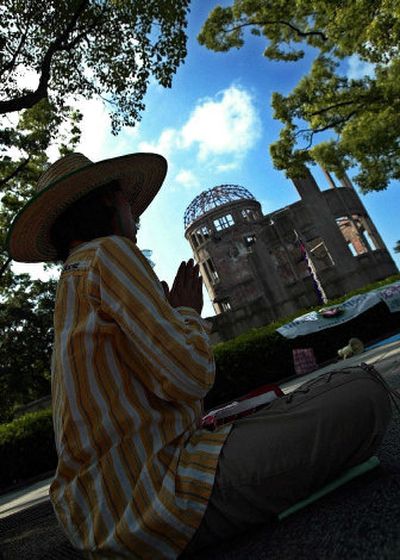Hiroshima’s anniversary urges peace

HIROSHIMA, Japan – On Saturday morning, 60 years to the minute after the apocalypse, tens of thousands of people will be packed into Hiroshima’s Peace Memorial Park. Wreaths will be laid and 1,000 doves set free. Temple bells will ring.
For Yoriko Takeuchi, 87, this is always a hard time of year. On Aug. 6, 1945, she lost just about everything.
As laughing children hang strings of paper cranes and TV crews stake out their positions for the main event, Takeuchi sits on a shady curb, her rake at her side. She and her volunteer cleaning crew have almost finished their six-hour shift sweeping up the park, and now she is taking a moment to reflect.
A Hiroshima native, she had been evacuated with many other women and children before the atomic bomb fell on her city. When she returned in December 1945, she found that she had lost her home, many of her relatives, just about everything.
“All I could see was just a flat, smoldering field,” she recalled.
Hiroshima today is a thriving city of nearly 3 million, probably best known in Japan for the Carp, its baseball team.
“It’s a miracle how the city has recovered,” said Takeuchi.
She believes Hiroshima’s message is a simple one.
“We went through hell because of atomic weapons,” she said. “No one else should ever have to. They should all be banned.”
The theme of peace permeates Hiroshima.
The broad, tree-lined thoroughfare leading to the park is called the “Promenade of Peace.” Hundreds of thousands visit Hiroshima’s Peace Museum every year, and they are greeted at the entrance by a Peace Clock, which counts the days since the bomb was dropped. On Saturday it will reach 21,915. (The bomb struck at 8:15 a.m., which is 4:15 p.m. Friday PDT.)
Every Aug. 6, Hiroshima becomes the epicenter of the global peace movement, but the tone can turn surprisingly combative.
Emotions are high ahead of the anniversary, as evidenced by the damage inflicted on a cenotaph whose inscription says: “Let all the souls here rest in peace, as we will never repeat this mistake.” The vandal is a suspected ultra-nationalist who apparently read the inscription to mean Japan might have been partially to blame for the bombing.
The first speaker at Saturday’s observances will be Hiroshima’s mayor, Tadatoshi Akiba, who last year called for a total ban on nuclear weapons and accused the United States of “ignoring the United Nations and international law” by researching a next-generation mininuclear weapon.
Akiba need not seek targets overseas.
Hiroshima has made it an article of faith for Japan that it will never possess, develop or allow onto its territory any nuclear weapons. Yet the past few years, however, some members of Prime Minister Junichiro Koizumi’s conservative party have begun to question that stance.
They say that because neighboring North Korea is believed to have both the Bomb and missiles able to reach virtually any part of Japan, it’s time for this country to at least debate whether to go nuclear.
“It’s just too much,” said Shogo Kadoya, a 70-year-old retiree who grew up in Hiroshima but escaped the bombing. “They aren’t hearing us.”
Koizumi is expected to attend Saturday’s ceremony.
Estimates vary, but about 140,000 people are believed to have died when the B-29 bomber named Enola Gay dropped its deadly payload, turning Hiroshima from a typical provincial city to a flaming inferno like none ever seen before.
Another plane, Bock’s Car, bombed Nagasaki, on the southern Japan island of Kyushu, killing at least 80,000 three days later. On Aug. 15, 1945, Japan surrendered.
Including those initially listed as missing or who died later from a loosely defined set of bomb-related ailments, including cancers, Hiroshima officials now put the total number of the dead in this city alone at 237,062.
This year, 5,000 more names are to be added to the list.
The feeling that their message is being lost is growing deeper here.
A global conference ended in May with no consensus on how to strengthen the Nuclear Nonproliferation Treaty – the biggest failure at a nonproliferation conference in 35 years.
The United States, meanwhile, has plans to keep 5,000 warheads – each far more efficient than the one that devastated this city. Russia, China, Britain, France, India and Pakistan, the confirmed nuclear powers, have no plans to give up their arsenals, either, and more countries are looking to join the club.
“I think everybody agrees that the world would be a better place without nuclear weapons,” said Helen Barlin, a 19-year-old tourist from Sachsenheim, Germany. “But with the politicians it’s all just words, words, words.”